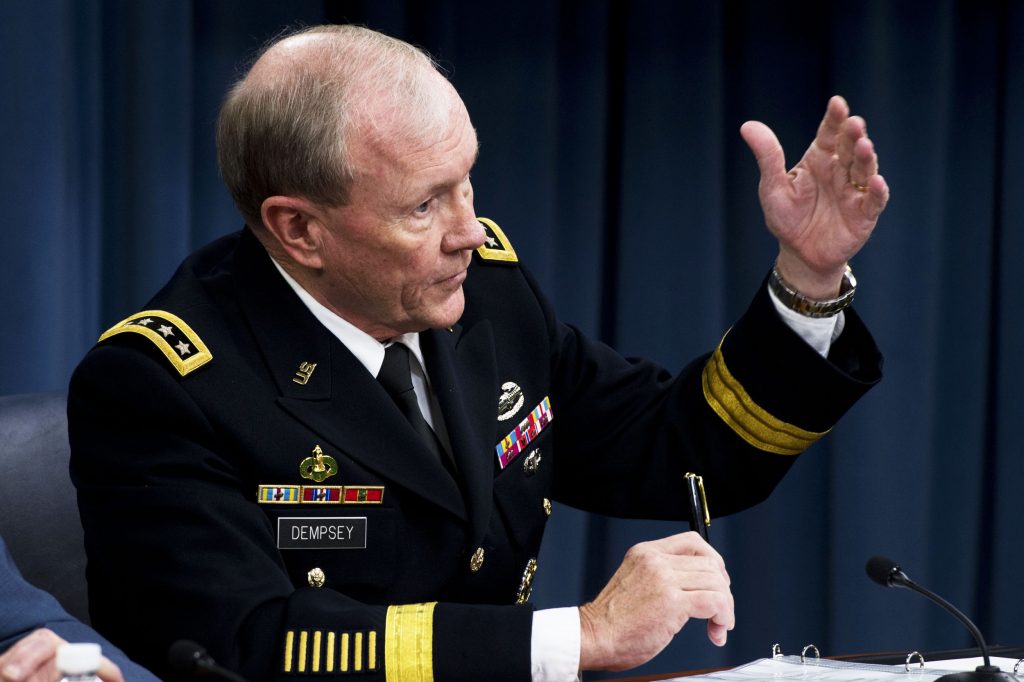Ex-top general rebukes Trump’s troops threat

Secretary of Defense Chuck Hagel and Chairman of the Joint Chiefs of Staff General Martin Dempsey brief the press at the Pentagon, June 26, 2013. Hagel announced that President Barack Obama has nominated General Dempsey and Vice Chairman of the Joint Chiefs of Staff Admiral Sandy Winnefeld to a second two year term. DoD photo by Erin A. Kirk-Cuomo (Released)
The ex-Joint Chiefs of Staff Chairman, Gen Martin Dempsey, told National Public Radio that Mr. Trump’s remarks were “very troubling” and “dangerous”.
Mr. Trump’s current and former defense secretaries have also spoken out.
On Monday, the president threatened to deploy the military to “quickly solve” the unrest if states failed to act.
Mainly peaceful protests have spread across the US since the death of African-American George Floyd in police custody last month.
While demonstrations over Mr. Floyd’s death appear to be simmering down in the nation’s capital, the White House’s security perimeter has expanded in recent days.
Police used batons and tear gas to clear protesters from nearby Lafayette Park on Monday, and have since erected high fences around the White House.
Who has criticized the president?
“The idea that the president would take charge of the situation using the military was troubling to me,” Gen Dempsey said in rare public remarks on Thursday.
“The idea that the military would be called in to dominate and to suppress what, for the most part, were peaceful protests – admittedly, where some had opportunistically turned them violent – and that the military would somehow come in and calm that situation was very dangerous to me,” he added.
Gen Dempsey served as America’s most senior military officer under former US President Barack Obama from 2011-15.
His criticism comes a day after former Marine Gen Jim Mattis, Mr Trump’s former defense secretary, denounced the president, saying he deliberately stoked division.
“Donald Trump is the first president in my lifetime who does not try to unite the American people – does not even pretend to try,” Mr Mattis wrote in the Atlantic magazine. “Instead, he tries to divide us.”
Mr Trump hit back via Twitter at the “overrated general”.
Earlier that day, Mr Trump’s current Defense Secretary Mark Esper had also spoken up.
He said the use of active-duty forces to quash unrest across the nation would be unnecessary at this stage, in remarks that are known to have displeased the White House.
What did Trump say about deploying the military?
Mr Trump said on Monday from the White House Rose Garden that he would act to disperse violent protesters.
“If a city or a state refuses to take the actions that are necessary to defend the life and property of their residents, then I will deploy the United States military and quickly solve the problem for them,” he said.
While he spoke, authorities used force to disperse a mainly peaceful protest nearby so the president could walk to a historic church that was damaged by fire in the unrest and be photographed holding up a Bible.
The justice department had ordered Lafayette Square, just outside the executive mansion, to be fenced off for Mr Trump’s walkabout.
By Thursday afternoon, that security zone was significantly expanded, with high fencing installed around the park area known as the Ellipse just south of the White House.
What other fallout has there been?
Also on Thursday, a moderate Republican Senator Lisa Murkowski broke ranks to say she was unsure if she would support Mr Trump’s bid for re-election.
In what is being seen as the most outspoken criticism yet of the president from a senator in his own party, Ms Murkowski told the Washington Post: “I thought Gen Mattis’s words were true and honest and necessary and overdue.”
Shortly afterwards Mr Trump tweeted that he would campaign to throw the Alaska senator out of office when she is up for re-election in 2022.
Meanwhile, the New York Times has said it was wrong to publish an opinion column by Arkansas Senator Tom Cotton entitled, Send in the Troops.
It comes after dozens of journalists at the newspaper criticized the decision to run the piece, tweeting it put “Black @nytimes staffers in danger”.
The Times initially defended its publication of Sen Cotton’s column, which called for the military to be deployed against protesters – saying that it wanted to provide readers with a range of opinion.
But the paper later issued a statement saying “a rushed editorial process led to the publication of an Op-Ed that did not meet our standards”.
Ayooluwa Joshua

